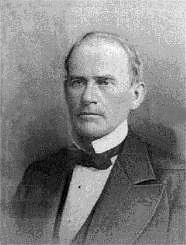Gove Saulsbury
| Gove Saulsbury | |
|---|---|
 |
|
| 41st Governor of Delaware | |
|
In office March 1, 1865 – January 17, 1871 |
|
| Preceded by | William Cannon |
| Succeeded by | James Ponder |
| Member of the Delaware House of Representatives | |
|
In office January 6, 1863 - March 1, 1865 |
|
| Personal details | |
| Born |
May 29, 1815 Kent County, Delaware |
| Died | July 31, 1881 (aged 66) Dover, Delaware |
| Political party | Democratic |
| Spouse(s) | Rosina Jane Smith |
| Residence | Dover, Delaware |
| Alma mater |
Delaware College University of Pennsylvania |
| Profession | physician |
| Religion | Methodist |
Dr. Gove Saulsbury (May 29, 1815 – July 31, 1881) was an American physician and politician from Dover, in Kent County, Delaware. He was a member of the Democratic Party, and he served in the Delaware General Assembly and as Governor of Delaware.
Saulsbury was born in Mispillion Hundred, Kent County, Delaware, son of William and Margaret Ann Smith Saulsbury. His father was a descendant of the Salusbury Family of Wales, but changed the spelling of the name after the American Revolution due to his family's loyalist sympathies. He was the older brother of U.S. Senators Willard Saulsbury, Sr., and Eli M. Saulsbury and the uncle of U.S. Senator Willard Saulsbury, Jr. Gove Saulsbury attended Delaware College in Newark and graduated from the University of Pennsylvania Medical School in 1842. He married Rosina Jane Smith and had five children: Margaret, Olivia Smith, Rosa, Gove, and William. Saulsbury was a medical doctor and lived at the northwest corner of the Green in Dover. He and his family were members of the Methodist Church. Saulsbury's choice of religious denomination sparked some controversy within the family as both of his brothers were staunch Episcopalians. In 1861 he was President of the Delaware Medical Society.
Saulsbury was elected to the State Senate and served in the 1863/64 and 1865/66 sessions. He was the Speaker in the 1865/66 session and succeeded to the office of Governor of Delaware on the death of Governor William Cannon on March 1, 1865. Defeating James Riddle of New Castle County, he was elected to a full term in his own right in 1866, and continued in office until January 17, 1871. He was a delegate to the Democratic National Convention] in 1876.
With Saulsbury as governor, the Democratic Party took full control in Delaware. Under Saulsbury’s leadership, this was a party that bitterly detested virtually anything associated with the Republican policies of the federal government, particularly its actions to end slavery and to expand the rights of African-Americans. Strongly opposed to the Thirteenth, Fourteenth, and Fifteenth Amendments to the U.S. Constitution, Saulsbury and the Democrats took every possible step to frustrate their implementation and deny the new rights given to African-Americans. This included the recommendation that African-Americans convicted of certain crimes be sold back into slavery. This fear-mongering was so successful that no Republicans were elected to the Delaware General Assembly in 1868, and hardly any were elected for many years thereafter.
...
Wikipedia
